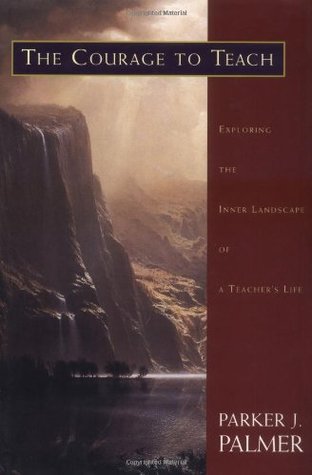The Courage to Teach
Parker Palmer (1998)
 “If you are a teacher who never has bad days, or who has them but does not care, this book is not for you”, writes Palmer in the introduction to The Courage to Teach.
This book is a call to reform education by focusing on nurturing the teacher’s inner Self. The inner Self of teachers goes largely neglected in most educational situations. Yet when it comes to learning outcomes, the quality of the teacher’s selfhood trumps technique every time. As Palmer puts it: “Technique is what teachers use until the real teacher arrives”. I believe this idea can be easily extrapolated beyond the classroom, rephrased as: Mechanical one-size-fits-all responses are what people use until they develop a strong awareness of Self-in-World. For those of us dwelling within the teaching profession, the book offers many pearls, such as placing strong emphasis on creating a subject matter-centered classroom rather than teacher-centered or student-centered. But I contend that practically everyone could find this book valuable. So if you are a teacher or non-teacher, Palmer’s book will bring fresh provocations on how to navigate challenges courageously, developing a self-awareness that can enable each of us to live an authentic life infused with intention and intensity.
“If you are a teacher who never has bad days, or who has them but does not care, this book is not for you”, writes Palmer in the introduction to The Courage to Teach.
This book is a call to reform education by focusing on nurturing the teacher’s inner Self. The inner Self of teachers goes largely neglected in most educational situations. Yet when it comes to learning outcomes, the quality of the teacher’s selfhood trumps technique every time. As Palmer puts it: “Technique is what teachers use until the real teacher arrives”. I believe this idea can be easily extrapolated beyond the classroom, rephrased as: Mechanical one-size-fits-all responses are what people use until they develop a strong awareness of Self-in-World. For those of us dwelling within the teaching profession, the book offers many pearls, such as placing strong emphasis on creating a subject matter-centered classroom rather than teacher-centered or student-centered. But I contend that practically everyone could find this book valuable. So if you are a teacher or non-teacher, Palmer’s book will bring fresh provocations on how to navigate challenges courageously, developing a self-awareness that can enable each of us to live an authentic life infused with intention and intensity.
- David Waters
From the Book’s Inside Jacket
Teachers choose their vocations for reasons of the heart, because they care deeply about their students and about their subject. But the demands of teaching cause too many educators to lose heart. Is it possible to take heart in teaching once more so that we can continue to do what good teachers always do – give heart to our students? In The Courage to Teach, Parker Palmer takes teachers on an inner journey toward reconnecting with their vocation and their students — and recovering their passion for one of the most difficult and important human endeavors. “This book builds on a simple premise: Good teaching cannot be reduced to technique; good teaching comes from the identity and the integrity of the teacher.” Good teaching comes in myriad forms, but good teachers share one trait: They are “truly present in the classroom, deeply engaged with their students and their subject.” They are “able to weave a complex web of connections among themselves, their subjects, and their students, so that students can learn to weave a world for themselves. The connections made by good teachers are held not in their methods but in their hearts — the place where intellect and emotion and spirit and will converge in the human self.” Palmer guides us through the inner work of teaching to help us create communities of learning — and he calls on educational institutions to support teachers in this work: “To educate is to guide students on an inner journey toward more truthful ways of seeing and being in the world. How can schools perform their mission without encouraging the guides to scout out that inner terrain?” For all who have been inspired by Palmer’s now-classic To Know As We Are Known: Education as a Spiritual Journey, this pioneering exploration of the teaching life is a long-awaited sequel that should be read by anyone who teaches, works with teachers, or cares about education.
